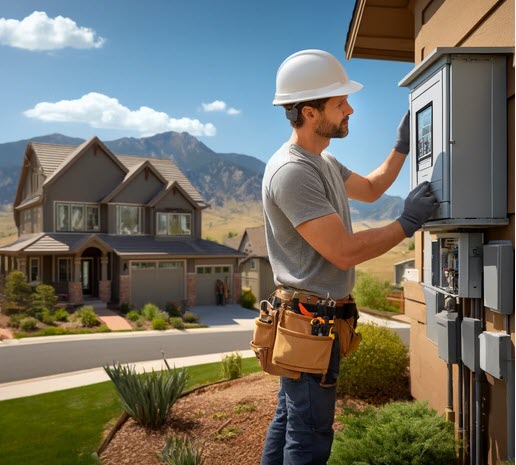Electricians in Colorado face varied risks from working across different terrains to legal challenges related to their work. In urban areas like Denver, they navigate tight spaces and high-rise hazards, while in mountainous regions, rugged terrain and access difficulties require specialized safety measures. Proactive risk management helps them protect their business and avoid financial setbacks.
Proper licensing and insurance are also crucial for Colorado electricians. Obtaining licenses through the Electrical Board exams shows their competence and professionalism. With a minimum $50,000 liability insurance in Colorado, they can cover costs from accidents or damages, such as property damage from a fire, ensuring business protection and client trust.
Common Risks for Electricians in Colorado
Electricians in Colorado deal with varied risks due to the state’s landscapes, weather, and legal rules. Rural electricians face resource scarcity and long travel times, affecting their business efficiency and profit. Suburban electricians must comply with local ordinances and homeowner associations to prevent disputes and legal issues. Tailoring risk management to their environment helps them mitigate challenges and safeguard their business.
Colorado’s weather, like snowstorms and hail, also poses risks to electricians and their equipment. Snowstorms can delay projects, affecting timelines and finances, while hail may damage costly equipment, requiring repairs or replacements. By planning projects strategically, securing equipment, and using protective gear, electricians can minimize weather-related damages and ensure their team’s safety and business continuity.
Proper Licensing Requirements
In Colorado, electricians must meet strict licensing criteria, including passing an Electrical Board exam, to work legally and ensure business safety. This process, particularly for those in commercial installations, verifies their expertise in complex systems, maintaining industry standards and safe, reliable client services.
Additionally, Colorado mandates a minimum $50,000 liability insurance for electricians, safeguarding them against financial risks from accidents, damages, or legal claims, such as property damage during work. This coverage, along with proper licensing, lets electricians operate confidently within state regulations.
Furthermore, adherence to Occupational Safety and Health Administration (OSHA) standards is essential for Colorado electricians. OSHA’s regulations, including the use of personal protective equipment and safety training, help prevent workplace injuries, ensuring a safer environment for their teams. Compliance with these rules enhances the electrician’s reputation and professionalism.
Essential Insurance Policies for Protection
Beyond liability insurance, Colorado electricians benefit from comprehensive policies like a Business Owner’s Policy. This combines General Liability with property insurance, covering third-party claims and business property losses, like tools and equipment. By consolidating these coverages, electricians streamline protection and enhance financial security.
Professional Liability Insurance, or Errors and Omissions, is also crucial for electricians. It covers legal costs from negligence or errors, such as overlooking safety procedures during installations. This insurance is vital in high-stakes environments like commercial projects, reducing risks from professional liabilities and protecting against legal disputes.
Additionally, as businesses increasingly rely on digital technology, Cyber Liability Insurance is essential. It protects against financial losses from data breaches, hacking, or cyberattacks that compromise sensitive information. This coverage can handle costs from data recovery, legal fees, and fines, helping electricians maintain data security and client confidentiality.
 Compliance with Colorado Regulations
Compliance with Colorado Regulations
Compliance with Colorado’s regulations is essential for electricians to legally and ethically work in the state. The Division of Professions and Occupations conducts inspections, ensuring adherence to electrical codes and public safety standards. Routine inspections verify compliance with regulations, safety protocols, and workmanship quality. Promptly addressing any issues helps electricians maintain compliance, build trust with authorities, and avoid penalties.
Colorado’s regulatory framework, combining state laws and local ordinances, ensures consistent electrical installations and safety across jurisdictions. Electricians must follow both state and local codes, like those in Denver, to meet safety and quality standards. Understanding and following these rules allows electricians to work confidently, aligning with legal and industry standards.
Additionally, electricians in Colorado must renew their licenses every three years and complete continuing education to stay updated with industry changes and safety practices. Attending workshops on new codes or technologies equips electricians with the skills to deliver quality services and maintain compliance. This commitment to education enhances their expertise and positions them as industry leaders.
Safeguarding Business Assets Effectively
Electricians in Colorado can enhance their business protection through various strategies beyond insurance. Regular risk assessments help identify potential threats and develop safety protocols for issues like high-voltage installations or hazardous materials, ensuring the safety of their team and clients.
Additionally, adopting technology and security measures protects digital assets and customer data. Using encryption for client databases, secure communication, and updated cybersecurity protocols guards against cyber threats like data breaches. Prioritizing data security boosts client confidence, upholds industry standards, and mitigates digital risks, enhancing the business’s reputation and ethical standing.
Furthermore, displaying liability insurance extends beyond financial protection, increasing market credibility and professionalism. By showing insurance coverage, electricians demonstrate a commitment to safety and quality, using it as a competitive advantage to attract new business and stand out in the market.
Tips for Cost-Effective Insurance
Electricians in Colorado can reduce insurance costs without sacrificing protection by adopting several strategies. Increasing deductibles on policies like General Liability Insurance helps lower premiums while ensuring readiness for claims. Electricians can balance cost savings and risk by adjusting deductibles according to their financial capacity and risk tolerance.
Regularly reviewing insurance policies ensures coverage remains adequate and cost-effective. Electricians should reassess their needs, identify coverage gaps, and compare quotes from various providers, especially when expanding services like adding solar installations. This proactive approach allows them to adjust coverage to meet changing business needs and enhance cost-efficiency.
Additionally, implementing safety protocols and training can lower insurance costs. Prioritizing safety, training employees, and enforcing risk management practices reduce accidents and claims. Actions like regular safety inspections and investing in safety equipment foster a culture of safety, potentially leading to lower premiums and discounts, boosting business profitability.
Licensing, Continuing Education, and Marketing Compliance
In Colorado, aspiring electricians can follow structured pathways to earn their licenses, ensuring they meet the high standards expected in the industry. The journey typically begins with an apprenticeship, where individuals engage in hands-on training under the guidance of seasoned electricians. This practical education is crucial as apprentices learn to navigate complex electrical systems, troubleshoot issues, and apply codes and regulations in real-world scenarios. Completing an apprenticeship not only imparts vital skills but also satisfies part of the state’s licensure requirements.
Following an apprenticeship, electricians often pursue additional on-the-job training or formal education to prepare for licensure exams. Colorado recognizes different levels of electrician licenses, including Apprentice Electrician, Residential Wireman, Journeyman Electrician, and Master Electrician. Each level has specific prerequisites, such as hours of work experience and successful completion of competency exams based on the National Electrical Code (NEC) and state-specific regulations.
To maintain transparency and credibility, electricians in Colorado must include their license number in all marketing materials. This adherence to truth-in-advertising laws ensures that clients receive accurate information about the electrician’s qualifications and services. For instance, when advertising residential electrical services, an electrician must clearly display their license number, reinforcing their legitimacy and adherence to state regulations.
Continuing education is another pillar of professional development for electricians in Colorado. It’s essential for keeping up with evolving electrical codes, emerging technologies, and best practices. By participating in courses and workshops on new regulations, safety practices, and technological advancements, electricians enhance their skills and knowledge, ensuring compliance with state standards and improving the quality and safety of their work. This ongoing learning commitment benefits both electricians and their clients, promoting a culture of excellence and safety in the electrical industry.
Protect Your Colorado Electrician Business
Safeguarding an electrical business in Colorado involves a blend of adhering to state regulations, selecting the right insurance coverage, and maintaining a commitment to safety and professionalism. Electricians navigate through various licensing levels, from Apprentice to Master Electrician, each requiring specific qualifications and a focus on safety standards. By incorporating comprehensive insurance policies like General Liability, Professional Liability, and Cyber Liability, electricians can protect their assets from potential risks and ensure their business runs smoothly. Continuous learning through courses and workshops keeps electricians up-to-date with industry changes, enhancing their service quality.
Electricians in Colorado also benefit from aligning their practices with state regulations and marketing standards. Including their license number in advertisements and following truth-in-advertising laws helps demonstrate transparency and builds trust with clients. Engaging in proactive risk management strategies, such as regular risk assessments and implementing safety protocols, reduces the likelihood of accidents and claims, optimizing insurance costs. These practices not only uphold the integrity and safety of electrical work but also position electricians as reliable, knowledgeable professionals in Colorado’s competitive market.











